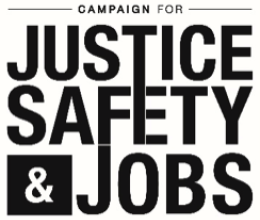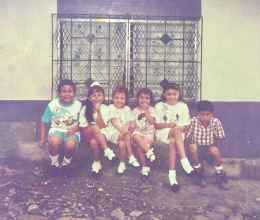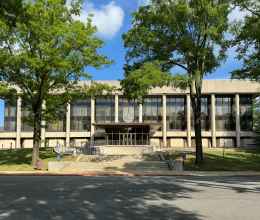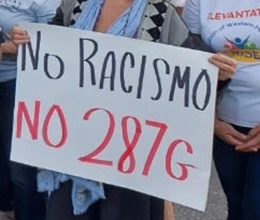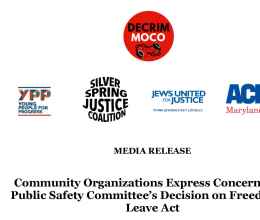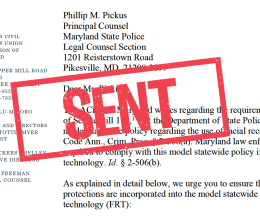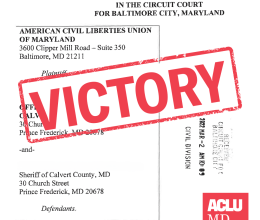
ACLU Seeks Body Camera Footage of Police Interactions with Residents During Harlem Park Cordon
Request Filed Under Maryland's Public Information Law
Read ACLU's public information request
BALTIMORE - In response to the many questions about the Baltimore Police Department's unprecedented decision to cordon off entire sections of Baltimore's Harlem Park neighborhood over the course of several days, the American Civil Liberties Union (ACLU) of Maryland has requested all body worn camera (BWC) footage recorded by officers working the perimeter and searching occupied dwellings following the death of Detective Sean Suiter. The ACLU request was filed under the Maryland Public Information Act.
"The public has a right to see body camera footage of police interacting with civilians during the unprecedented cordon in Harlem Park," said David Rocah, Senior Staff Attorney with the ACLU. "The publicly stated rationale for the cordon, the need to preserve a crime scene, seems inconsistent with both the scope and duration of the cordon, and with the other police actions that were taken, such as searches, demanding identification, and barring non-residents. In those circumstances, there is a need for greater transparency, which is precisely why we have body cameras in the first place."
From Nov. 15 to Nov. 21, the Baltimore Police Department restricted pedestrian and vehicle access to multiple streets in the Harlem Park neighborhood following the shooting. Press reports also stated that at least some persons entering or leaving the area were subject to pat down searches; that residents had to show identification to travel through the cordon; and that non-residents were barred from entering the area.
The ACLU seeks the following records:
1. All body worn camera footage recorded by officers working the perimeter of the cordon involving an interaction with a civilian;
2. All BWC footage involving police escorting civilians to or from the police cordon;
3. All BWC footage involving the first ten minutes of searches of occupied dwellings within the police cordon (not footage of searches of abandoned or vacant buildings);
4. Any logs of BWC footage recorded by officers working the perimeter of the cordon showing the number of times the BWC was activated, and the duration of the recording.
The ACLU expects that the faces (or other identifying information) of persons whose interactions with police were recorded will be redacted prior to disclosure, to hide their identity and preserve their privacy.
At least one federal appellate court, in Mills vs. District of Columbia, has ruled unconstitutional a similar police cordon and checkpoint system that was imposed 2008 in the Trinidad neighborhood in Washington, DC.
###


